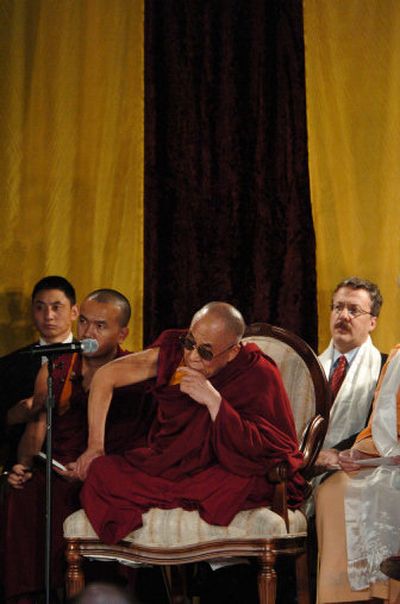Dalai Lama, Muslims meet on extremism

SAN FRANCISCO – Prominent Muslim dignitaries on Saturday met for the first time with the world’s most influential Buddhist, the Dalai Lama, enlisting his help in quelling fanatical ideologies within Islamic communities and improving the faith’s declining image in the West.
The summit was a measure of desperate concern among moderate Muslim leaders and scholars about religious extremism and increasingly negative views of their faith arising from Western concerns about terrorism. Islam traditionally has not recognized Buddhism.
“The main issue of this conference is to provide a platform to teach that there is no room today to say or invest in anything but love,” said Imam Mehdi Khorasani of California’s Marin County, who extended the invitation to the Dalai Lama. “We are happy and grateful for His Holiness’ decision to lend his energy to this cause.”
Appearing comfortable and jovial in his maroon-and-saffron robe before a crowd of about 600, the Dalai Lama, 71, was true to his image as one of the world’s most avid advocates for peace.
“Some people have an impression that Islam is militant,” he said, seated in a lotus position on a center-stage baronial chair at the Mark Hopkins International Hotel. “I think that is totally wrong. Islam is one of the world’s great religions and it carries, basically, a message of love and compassion.”
He pointed to his homeland of Tibet as an example of a place where Buddhists and Muslims have existed together in peace for centuries.
In an interview earlier, the Nobel laureate and religious leader of Tibetan Buddhism said, “Promoting the genuine message of Islam and the proper impression of the Muslim world, that is my hope.”
“Some of my Muslim friends have told me that those people who claim to be Muslims, if they create bloodshed, that is not genuine Islam,” he said. “Those few mischievous ones do not represent the whole Muslim community.”
Some of those in attendance suggested that the open display of mutual support might not play well with more extreme members of either Islam or Buddhism.
“It’s a brave thing for imams to reach out to the Dalai Lama – it’s likely to be seen in some circles as an act of weakness, and undignified of their own traditions,” said Caner Dagli, assistant professor of religion at Roanoke College in Salem, Va.
“The Dalai Lama is also putting himself out on a limb by standing with his Muslim brothers and sisters,” he said.
That the meeting came together at all was remarkable – around the time of the Muslim Prophet Muhammad’s birthday, as well as during the Jewish Passover and Christian Easter weekend.
The Dalai Lama, who books his appearances seven years in advance, and the Muslim leaders and scholars from around the world broke their holiday commitments to attend the hastily organized event.
Under tight security, the Dalai Lama initially met behind closed doors with 40 leaders including Mahmud Kilic, a professor of Sufism and president of the Turkish and Islamic Art Museum in Istanbul, and Sayyid M. Syeed, head of the Islamic Society of North America, the national’s largest umbrella organization of Islamic centers in the U.S.
One proposal to emerge from the discussions: a possible visit by the Dalai Lama to Saudi Arabia.